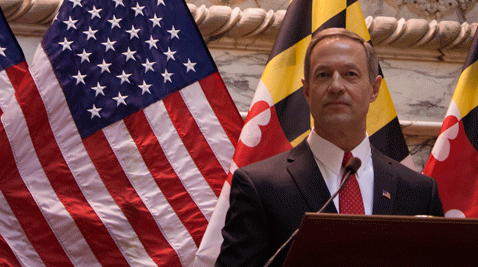WASHINGTON–Speaking at the Brookings Institute on Wednesday, a soft-spoken Martin O’Malley resembled the policy wonks that populate Capitol Hill think tanks.
He talked about computer models, cited percentages and referenced Moneyball.
It’s one of the reasons the former Maryland governor’s potential run for president has been seen as a long shot in a Democratic primary against the air of inevitability that has surrounded Hillary Clinton since she stepped down as Secretary of State two years ago.
But just one day earlier, while Clinton addressed a week of controversy surrounding her use of a private email address while at the State Department, O’Malley the politician drew standing ovations from a room filled with firefighters by calling for a renewed commitment to collective bargaining.
O’Malley, who left office in January, has repeatedly said he is seriously considering running for president and that he plans to make a decision sometime this spring. More and more his actions look like those of a candidate.
In the last couple of weeks, O’Malley has visited the early primary states of New Hampshire and South Carolina, spoken at the legislative conference for the International Association of Fire Fighters, given a policy speech at the Brookings Institute and appeared on a morning cable show.
These events have all included questioning about the appropriateness of Clinton’s private email account, but O’Malley has refused to criticize the assumed front-runner for the Democratic nomination.
Still, the past week has allowed O’Malley to showcase himself while some consider what would happen if Clinton were not in the race.
“[Clinton] hasn’t been handling things all that well and I think a lot of Democrats are starting to think that Obama beating her in 2008 wasn’t a fluke, that she might once again run as poorly managed a campaign as she did then,” said Todd Eberly, a professor of political science at St. Mary’s College of Maryland.
O’Malley echoed that sentiment during his appearance on MSNBC’s “Morning Joe” on Thursday morning.
“Our history as a party is one of always wanting to have robust discussions about the better choices that will give our kids a better future,” O’Malley said. “Most years there is the inevitable front-runner and that inevitable front-runner is inevitable right up until he or she is no longer inevitable.”
When Sen. Barbara Mikulski, D-Md, announced her retirement this month, many thought O’Malley would take the opportunity to cut his losses and run for the Senate.
Instead, the day after Mikulski’s announcement, O’Malley said he would not be seeking the Senate seat. That was the day after The New York Times published a story about Clinton’s private email account.
“I think O’Malley just looked at that and said ‘I’m just going to keep going.’ Because if she does flame out, it’s wide-open season and a whole bunch of people who are polling down near 0 percent are suddenly going to be on folks’ radar screen,” Eberly said.
O’Malley has been polling poorly in many early states, registering in the low single digits in most polls.
The weekend of March 20, O’Malley will visit Iowa where, in February, a Quinnipiac poll found that 0 percent of likely Iowa caucus participants would pick O’Malley as their first choice and only 3 percent picked him as their second choice.
Eighty-four percent of those polled said they hadn’t heard enough about O’Malley to have either a favorable or unfavorable opinion of him.
To gain traction in Iowa, O’Malley needs to become more than another bland nice guy, said Cary Covington, a professor of political science at the University of Iowa.
“He needs a signature issue,” Covington said. “A popular song always has a hook you can’t get out of your head. He needs that hook.”
One issue that could resonate with Iowans, and helpfully channels the popular Elizabeth Warren, is limiting the influence of Wall Street, Covington said.
O’Malley visited New Hampshire last weekend, where he spoke with a local television station and at some small gatherings. At these events, according to reports, O’Malley spoke about limiting the influence of big money in politics and restoring the Glass-Steagall Act that required banks to keep their commercial and investment activities separate. That act was repealed in 1999 under President Bill Clinton.
“For 70 years we have prevented banks from gambling with our money and wrecking our economy and running roughshod over the common good that we share as a people,” he said on “Morning Joe” on Thursday.
If O’Malley really wants to go after Hillary Clinton for the nomination — as opposed to just running for name recognition or to earn a cabinet position — he has to draw more contrasts with her, starting with the email controversy, Covington said.
“He has to raise his profile and get sharp elbows,” Covington said. But he also has to avoid burning bridges.
On Wednesday at the Brookings Institute in Washington, where O’Malley was speaking about the CitiStat and StateStat initiatives he championed as mayor of Baltimore and governor of Maryland, O’Malley was asked again about email.
After answering a couple of questions about how he followed all applicable state laws as governor, including that emails do not have to be archived, he hadn’t mentioned Clinton once.
When asked directly about Clinton and Tuesday’s press conference to address the email controversy, O’Malley said he hadn’t watched. When pressed on why, he said, “Because I was working.”
Covington said that’s the right approach because O’Malley doesn’t want to come on too strong and get lumped in with the Republicans attacking Clinton, but should also point out that he always followed the rules.
Talking about his data-driven approaches to government on Wednesday, O’Malley called for those approaches to be applied to the federal government.
“Too many federal goals are about process and not about outcomes,” he said. “What we need is nothing short of a new method of executive management.”

